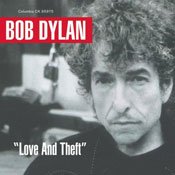My family subscribed to Rolling Stone magazine through my grade school years. Though the stories often went over my head, I was always avidly interested in the album reviews—especially the star rating. I committed their key to memory at an early age: Three stars is "Good," four stars is "Excellent," five stars is "Classic." For the first six years or so that we got the magazine, I can't recall a single non-compilation release earning the coveted five-star rating.
Theft" made personal history for me. I remember boggling at the five-star rating, gasping audibly and counting the stars with my finger the way a first-grader might count stickers on his conduct chart. The next chance I got, I went to the store to buy the record.
A few short months after "Love and Theft," the bastardization of Rolling Stone's five-star rating began. Mick Jagger's tepid "Goddess in the Doorway" earned a five-star rating when it was universally thought to deserve about half of that. Since then, the five-star rating has appeared much more frequently. The magazine's recent adornment of the "Classic" label upon two pedestrian albums—Bruce Springsteen's "Working on a Dream" and U2's "No Line on the Horizon"—proves that the magazine truly has lost its review compass.
The most obvious way to identify a classic record is if the album has great songs, beginning to end. Any album that you can play and not feel concerned about your stereo remote being out of batteries is a classic. This is a difficult feat, but there are ways an album can earn a classic rating even if a less-than-great song or two make the final album cut.
If the album has a truly genre-changing feel, it can be regarded as classic. Every song on Nirvana's "Nevermind" isn't "Smells Like Teen Spirit," but the album left you with the feeling that it would have an immediate tangible effect on pop music's sound and theme. It wasn't until "Sgt. Pepper's" that the Beatles started flirting with album perfection, but their early records are still classics because of their impact on their peers.
If an artist makes a record for reasons greater than simple consumption, I congratulate the musician, especially in this anti-intellectual pop-music age. We recognize that Stevie Wonder's "Songs in the Key of Life" is imperfect, but still consider it a five-star record because of this reason.
We should reward a band willing to alienate their fans with a new sound or message. This includes Green Day's denouncement of the apathy and suburban lifestyle enjoyed by so much of their base on "American Idiot" and The Clash's willingness to upset their fans by expanding beyond punk's limited sonic confines with "London Calling."
Critics should consider artistic audaciousness. "London Calling" again comes into play here as do Outkast's albums, which have never received a five-star rating. Any casual Outkast listener is able to listen to one of their songs and accurately classify the song into a writing period based on the sound, just the way a Beatles listener is able to differentiate their early songs from their latter-era material.
An album composed of mostly great songs filling any one of these criteria is exceedingly rare. When they do come along, we should reward them with an honest "Classic" rating, not group them in with "Goddess in the Doorway."



Comments
Use the comment form below to begin a discussion about this content.
comments powered by Disqus